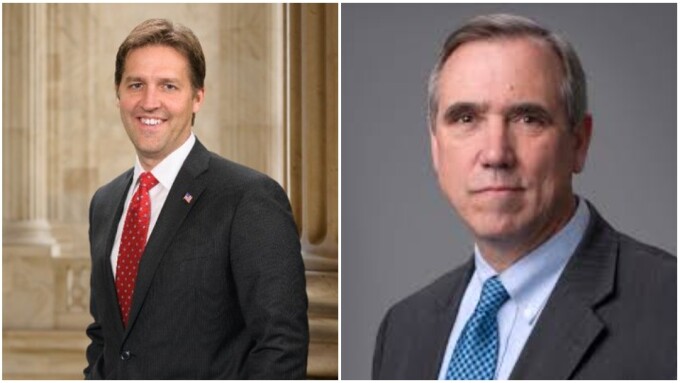WASHINGTON, D.C. — Earlier today, Senators Ben Sasse (R-Neb.) and Jeff Merkley (D-Ore.) introduced bipartisan legislation, dubbed the "Stop Internet Sexual Exploitation Act," intended to "prevent the uploading of pornographic images to online platforms without the consent of the individuals in the images."
Nine months ago, Sasse penned a letter to Attorney General William Barr demanding an investigation into Pornhub; he recently told right-wing news site Daily Caller that “the Department of Justice needs to open an investigation into the scumbags who run Mindgeek."
In today's announcement, Sasse's office cited unnamed "disturbing reports of how videos and photos are uploaded to websites like Pornhub without the consent of individuals who appear in them — haunting and traumatizing victims."
Merkley acknowledged "some online platforms have recently announced steps to change some practices [but] much more needs to be done."
The proposed legislation, if enacted, would apply to "all online platforms that host pornography," noted a summary provided by Sasse's office. "This legislation does not intend to modify existing law under the Communications Decency Act, Section 230."
A wide variety of intended restrictions and stipulations on adult platforms include the following:
- Require any user uploading a video to the platform verify their identity.
- Require any user uploading a video to the platform also upload a signed consent form from every individual appearing in the video.
- Creates a private right of action against an uploader who uploads a pornographic image without the consent of an individual featured in the image.
- Require platforms hosting pornography include a notice or banner on the website instructing how an individual can request removal of a video if an individual has not consented to it being uploaded on the platform.
- Prohibit video downloads from these platforms, to be in place within three months of enactment of this legislation.
- Require platforms hosting pornography offer a 24-hour hotline staffed by the platform. Individuals who contact the hotline can request removal of a video that has been distributed without their consent.
- Require removal of flagged videos as quickly as possible, but not to exceed two hours.
- Require platforms to use software to block a video from being reuploaded after its removal. The platforms must have this software in place within six months of enactment of this legislation.
- Directs the Federal Trade Commission to enforce violations of these requirements.
- Creates a database of individuals that have indicated they do not consent. The database must be checked against before new content can be uploaded to the platforms.
- Instructs the Department of Justice to promulgate rules on where this database should be housed, and determine how to connect these victims with services, to include counseling and casework.
- Failure to comply with this requirement will result in a civil penalty to the platform, with proceeds going towards victims services.
Images: Sen. Ben Sasse (left); Sen. Jeff Merkley (right)







